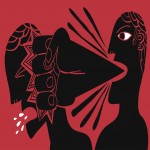Introduction
‘Don’t believe everything you think’. This essential mantra underpins much of what has become known as Cognitive Behavioural Therapy (CBT). Developed originally by Aaron T Beck and colleagues, who observed that people with depression were more prone to experience negative cognitive biases, or ‘automatic thoughts’ which he argued became central to maintaining their difficulties, CBT combines our understanding of cognitive theory and behavioural psychology as a psychological treatment for a range of mental health problems.
More recently, so called ‘third wave’ cognitive therapies have incorporated therapeutic elements of CBT to create new interventions targeting specific client groups or set of difficulties. These include dialectical behaviour therapy (DBT), commonly used with people with a diagnosis of personality disorder or complex trauma, and mindfulness-based cognitive therapy (MBCT) for the treatment of, well, near enough anything.
In England, the Improving Access to Psychological Therapies (IAPT) initiative provides countrywide access to free face-to-face and computerised CBT (cCBT) for common mental health difficulties, via NHS services.
What we know already
In the world of psychological treatments, Cognitive Behavioural Therapy (CBT) is rather en vogue. According to NICE guidelines, CBT should be offered as first line treatment for common mental health difficulties, as well as be routinely offered where psychological difficulties such as depression exist alongside chronic physical health conditions such as heart failure, respiratory disease, or following stroke. We know that CBT works particularly well for anxiety-related difficulties and post-traumatic stress disorder (PTSD).
Areas of uncertainty
There is an element of controversy though. The recent proliferation of CBT in mainstream mental health services has come at the expense, some might say, of other treatments (such as psychodynamic therapy, which is typically of longer duration). The controversy arises partly from the fact that, in many studies, CBT has been shown to be no more effective than other treatments, with a few notable exceptions.
You’ll see many fine elves blogging about the ‘dodo bird verdict’, essentially that all psychological therapies are equal in their effectiveness. The debate concerns the fact that neither the quality nor quantity of evidence necessarily indicates effectiveness, and CBT has benefitted from being much more widely researched over the past two decades.
The debate into research bias and the quality of evidence for CBT remains ongoing, particularly in areas such as psychosis.
What’s in the pipeline?
The IAPT programme is continuing to expand the availability of CBT for children, people with long-term physical health conditions and serious mental health difficulties such as psychosis.
cCBT will no doubt adapt to new technologies in providing novel platforms for therapy.
CBT doesn’t work for everyone. Hopefully the debate surrounding CBT will drive further rigorous research, with a focus on those for whom CBT is unsuccessful.
References
NICE (2009) Depression in adults with a chronic physical health problem: Treatment and management [CG91] [PDF]
NICE (2011) Common mental health disorders: Identification and pathways to care [CG123] [PDF]
Layard, R., & Clark, D. M. (2014). Thrive: The power of evidence-based psychological therapies. Penguin UK. [Publisher]
Acknowledgement
Written by: Patrick Kennedy-Williams
Reviewed by:
Last updated: Sep 2015
Review due: Sep 2016










